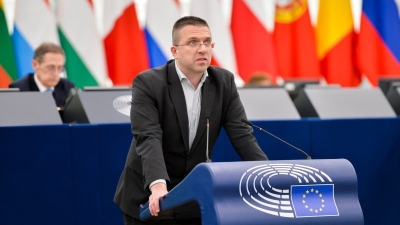Who wants to kill the EU’s green buildings law?

Welcome to EURACTIV’s Green Brief, our weekly selection of energy and environment news from across Europe. To subscribe, follow this link. You can also subscribe to our daily newsletter here and to our comprehensive weekly update here.
“Try again. Fail again. Fail better.” Samuel Beckett’s mantra sounds like a perfect fit for the European Union’s latest attempt to revamp its green buildings law.
With the Green Deal launched in 2020 and the energy crisis hitting Europeans directly at the wallet, political momentum appeared to build up in favour of an ambitious revision of the EU’s Energy Performance of Buildings Directive (EPBD).
After all, reducing energy consumption became an urgent priority in order to reduce the EU’s dependence on Russian gas, which feeds into the millions of boilers currently installed in European homes.
“Faced with war, with a fossil fuel crisis, the arguments in favour of the Renovation Wave have only become more pressing,” said Ursula von der Leyen, the President of the European Commission.
“Investing in renovation is a no regret option,” she told delegates at last year’s Renovate Europe Day.
At the centre of the revised EPBD is the introduction of minimum energy performance standards (MEPS) that would trigger the renovation of the worst-performing buildings.
“MEPS are the backbone of this legislation. They define a clear trajectory for improving individual buildings which will support more renovations and mobilise the market towards our decarbonisation goal,” explained Ciarán Cuffe, the Irish lawmaker driving the reform in the European Parliament.
But while there is a large consensus to raise ambition on energy efficiency, translating this into EU law is a different matter, where national divergences quickly come into play.
When the Council of the EU voted its position in October, EU member states almost neutered the mandatory renovation principle, in spite of resistance from a seven-country coalition led by Germany, France, and Denmark.
Now, it’s the European Parliament having a go at the proposal, with far-right and conservative parties banding together to water down the EPBD.
Their arguments are broadly similar: with its mandatory renovation targets, the EPBD risks making housing unaffordable to tenants and homeowners who are already struggling with rising energy bills. The law, they argue, also ignores the particularities of historical buildings, which require special attention.
Rome has led the rebellion, with far-right minister Matteo Salvini saying his government “will oppose it, in the name of common sense and realism, as a government but above all as Italians”.
Parliament eventually foiled attempts to torpedo the EPBD when the directive came to a plenary vote on Tuesday (14 March). But this may have been down to luck, as rebel lawmakers from the conservative EPP group, the nationalist ECR and the far-right ID group apparently mistakenly voted to reject the amendments they intended to support (or the other way round, actually).
To be sure, it’s only a question of time before Italy, Poland and others reiterate their demands when the directive enters final negotiations between Parliament and EU member states in the coming months.
“With the current text, we could envisage the substantial inapplicability of the directive,” Italy’s Energy Minister Gilberto Pichetto Fratin warned after the Parliament vote, saying this could cause the EU’s wider “green objective to fail”.
Under attack from all sides, it seems inevitable that the EPBD will be diluted again – and it won’t be the first time.
In 2010, when EU countries agreed a revision of the EPBD, EU countries pushed back vigorously against attempts to impose mandatory renovation thresholds on member states.
Brook Riley, a lobbyist at insulation manufacturer Rockwool, was a green activist back in 2010. He remembers the widespread scepticism back then over a proposal to mandate all new buildings to be nearly zero energy.
“The deadline was ten years away – 2021 – but the naysayers had a field day,” he recalled.
The scepticism was later reflected in the subsequent revision of the Energy Efficiency Directive (EED) in 2012, which restricted mandatory renovation targets for public buildings to those that are “owned and occupied” by the central government – a definition which severely restricted its scope.
“The central government authorities-only line was quite something,” Riley said. The limitation meant that “less than 0.4% of the overall stock was covered” in the end, he told EURACTIV.
Yet, there are reasons to hope that some mistakes won’t be repeated this time around.
When the EPBD was last updated in 2017, EU countries agreed a 2050 objective to decarbonise the Union’s entire building stock, including long-term renovation strategies and national plans with milestones for 2030 and 2040.
Last week, EU legislators agreed a new revision of the Energy Efficiency Directive. For the first time, they introduced a legally-binding obligation on EU member states to collectively achieve an 11.7% reduction in energy consumption by 2030 compared to 2020 projections.
Although efficiency campaigners had hoped for more ambition, they nevertheless welcomed the deal on the EED, saying it “represents an improvement” over the last version, agreed in 2018 after significant concessions were made to EU member states.
“For the first time, the Europe Union sets itself a binding energy efficiency target and a mechanism to enforce it,” said Adrian Joyce, secretary general of EuroACE, a coalition bringing together leading companies involved in energy efficiency solutions for buildings.
“This addresses one of the main weaknesses of the previous Energy Efficiency Directive,” he said.
As often in the European Union, things eventually get to move forward. It only takes a little bit of perseverance. “Try again. Fail again. Fail better” as Beckett would say.

EU unveils power market reform to tame volatile electricity prices
The European Commission published its proposal to reform the EU electricity market on Tuesday (14 March), focusing on countering volatile gas prices by providing consumers with more protection, boosting renewables and supporting demand-side measures.
“For over two decades, …

EU Parliament agrees position on buildings law despite pushback
The European Parliament approved its stance on the Energy Performance of Buildings Directive (EPBD) on Tuesday (14 March), setting out a more ambitious position ahead of negotiations with EU countries.

New EU energy efficiency directive sets 11.7% reduction target by 2030
EU lawmakers have agreed to increase the ambition of the bloc’s energy efficiency directive, making energy savings of 11.7% by 2030 mandatory in a bid to further the bloc’s climate and energy independence goals.
WARSAW. Polish president signs wind turbine law in bid to unlock EU funds. President Andrzej Duda has signed an amended wind turbine law which could help Poland access currently frozen EU recovery funds despite the industry and environmental NGOs viewing it as insufficient. Read more.
LISBON. Portugal’s renewables, air quality better than OECD average: report. Portugal performs well in areas such as renewable energy, greenhouse gas emissions and air quality but needs to improve in waste recovery and the circular economy, according to a report released on Tuesday. Read more.
WARSAW. Poland wants to loosen EU methane proposal, fears huge fines. Poland intends to push for the EU proposal to reduce and track methane emissions to allow mines to emit eight rather than five tons of methane per one kilotonne of coal mined, as well as exempt coking coal from new regulations, Poland’s Deputy Minister of State Asset, Marek Wesoły has announced. Read more.
VIENNA. Austria joins Germany in opposing combustion engine ban. Austrian Chancellor Karl Nehammer has promised he will do his utmost to ensure the survival of the combustion engine, joining Germany in opposing the EU’s plan to ban diesel and petrol cars from 2035. Read more.
PARIS. Germany ‘not opposed’ to nuclear-made hydrogen, says will import from France. Germany will “acknowledge and not oppose” plans to recognise the contribution nuclear energy is making to the EU’s decarbonisation objective, a special advisor to the German Chancellor said on Thursday. Read more.
BERLIN. Commission, Germany edge closer towards combustion engine ban deal. The European Commission and Germany’s Digital and Transport Ministry are confident an agreement on the EU combustion engine ban can be reached, after a call between Transport Minister Volker Wissing (FDP/Renew Europe) and EU Climate Chief Frans Timmermans on Thursday. Read more.
- Construction sector bets on EU green buildings law as new growth engine – Nikolaus J. Kurmayer
- EU’s Breton: Joint debt for green transition no longer a priority – Théo Bourgery-Gonse
- EU Commission rejects priority industry access to recycled PET bottles – Valentina Romano
- Industries unite behind nuclear-made hydrogen, in addition to renewables – Frédéric Simon
- EU agrees to push for global fossil fuel phase-out ahead of COP28 – Reuters
- EU loosens subsidy rules for green tech – AFP
- Brussels prepares ‘strategy’ to boost deployment of heat pumps – Nikolaus J. Kurmayer
- Denmark inaugurates world’s first cross-border CO2 storage site – Kira Taylor
- Critical minerals: recycling ‘not a silver bullet’, industry says – Frédéric Simon
- Women more likely to fall into energy poverty, EU Parliament warns – Valentina Romano
NGOs ask for ‘clear’ regulation on carbon removals. Environmental groups have called for an ambitious certification framework for carbon removals ahead of a debate among EU ministers in the Environment Council on Thursday (16 March).
The NGOs – including the Clean Air Task Force (CATF), Bellona Foundation, Carbon Gap and ECOS – support the scaling up of carbon dioxide removal (‘CDR’) to accelerate net emissions reductions and to address residual emissions in hard-to-abate sectors.
In a joint statement, they welcome the Commission proposal for a Carbon Removal Certification Framework (‘CRCF’), arguing that “the legislative proposal is a first and significant step toward developing a strong carbon removal capability in Europe that contributes to the EU’s climate goals”.
However, the proposal presents “several critical shortcomings” that co-legislator must address to ensure that carbon removal delivers real climate benefits, according to them. In particular, the EU should adopt a clear definition of carbon removal, consistent with scientific consensus, with a clear distinction between carbon removal and emissions reductions.
Alongside this, the NGOs ask for clear guidelines to govern the use of removal certificates that acknowledge the different forms of carbon storage and stages of maturity of carbon removal methods, while keeping removals and emission reductions separate. The joint statement is available here. (Valentina Romano | EURACTIV.com).
- A transatlantic opening on green industrial policy? – Abigail Wulf and Kaare Nielsen
- Poland’s new challenge to Germany on energy supply – Alessandro Bertoldi
- The inconvenient truth about EU’s climate and energy ambition – Brigitta Bozsó and Klaus Röhrig
- Europe needs an investment plan to win the global cleantech race – Thomas Pellerin-Carlin
- Energy efficient buildings: the insurance policy against high energy bills – Ciarán Cuffe
- Building resilience in Europe – Seán Kelly
- Sustainable construction: lessons from Helsinki – Tomi Rantala and Kaisa-Reeta Koskinen
- The EU needs a business case for carbon removals – James Cogan
MARCH
- 16 MARCH. Environment Council.
- 22 MARCH. Consumers package:
- Substantiating environmental claims
- Sustainable consumption of goods – promoting repair and reuse (the right to repair)
- 22-24 MARCH. UN Water Conference, New York.
- 23-24 MARCH. European Council.
- 28 MARCH. Energy Council.
APRIL
- 18-19 APRIL. Informal meeting of environment ministers.
MAY
- 17 MAY. Measures to reduce the release of microplastics in the environment.
JUNE
- JUNE. European Parliament Plenary vote on the EU Nature Restoration Law.
- 6-7 JUNE. EU Green Week.
- 19 JUNE. Energy Council.
- 20 JUNE. Environment Council.
- 21 JUNE. Greening transport package.
- 29-30 JUNE. European Council.
- 30 JUNE. Deadline for European Member States to update their revised National Energy and Climate Plans (NECPs).
SECOND HALF OF 2023
- Q4. Revision of REACH regulation.
- 26-27 OCTOBER. European Council.
- 30 NOVEMBER-12 DECEMBER. UN Climate Change Conference (COP 28), Dubai.
- 14-15 DECEMBER. European Council.



